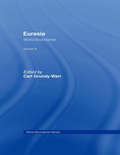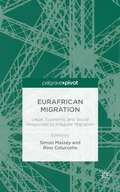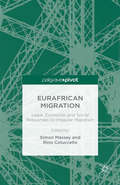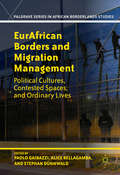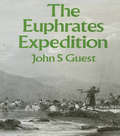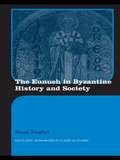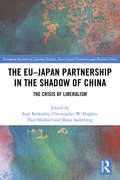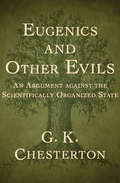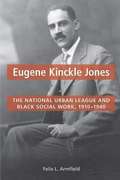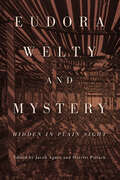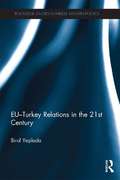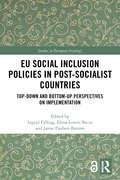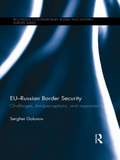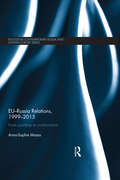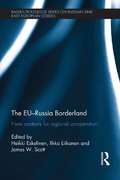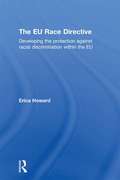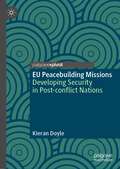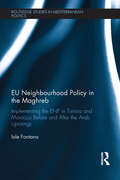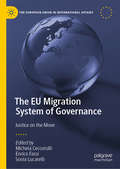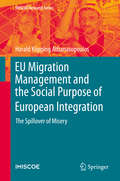- Table View
- List View
Eurasia: World Boundaries Volume 3 (World Boundaries Series #Vol. 3)
by Carl Grundy-WarrEurasia offers a wide-ranging and original interpretation of territory, boundaries and borderlands in Europe, Asia and the Far East. This forms part of a unique series of books focussing on world boundaries which embrace the theory and practice of boundary delimitation and management, boundary disputes and conflict resolution, and territorial change in the new world order.
Eurafrican Migration: Legal, Economic And Social Responses To Irregular Migration
by Rino Coluccello Simon MasseyInformed by witness testimonies, Eurafrican Migration details how the perilous journeys undertaken by irregular migrants are enabled by complex networks of guides during the Sahara phase, and explores the relationship between migrants and the criminal groups who arrange for them to be transported across the sea to southern Europe.
Eurafrican Migration: Legal, Economic and Social Responses to Irregular Migration
by Simon Massey Rino ColuccelloInformed by witness testimonies, Eurafrican Migration details how the perilous journeys undertaken by irregular migrants are enabled by complex networks of guides during the Sahara phase, and explores the relationship between migrants and the criminal groups who arrange for them to be transported across the sea to southern Europe.
EurAfrican Borders and Migration Management: Political Cultures, Contested Spaces, and Ordinary Lives (Palgrave Series in African Borderlands Studies)
by Paolo Gaibazzi, Stephan Dünnwald and Alice BellagambaThis volume traces the African ramifications of Europe’s southern border. While the Mediterranean Sea has become the main stage for the current play and tragedy between European borders and African migrants, Europe’s southern border has also been “offshored” to Africa, mainly through cooperation agreements with countries of transit and origin. By bringing into conversation case studies from different countries and disciplines, this volume seeks to open a window on the backstage of this externalization of borders. It casts light on the sites – from consulates to open seas and deserts – in which Europe’s southern border is made and unmade as an African reality, yielding what the editors call "EurAfrican borders." It further describes the multiple actors – state agents, migrants, smugglers, activists, etc. – that variously imagine, construct, cross or contest these borders, and situates their encounters within the history of uneven exchanges between Africa and Europe.
Euphrates Expedition
by John. S. GuestFirst published in 1992. This book invites the reader to cast the mind a hundred and fifty years back to a short span of time between 1829 and 1842. This was an exciting period when Britain’s might, demonstrated to the world at Trafalgar and Waterloo, was fortified by leadership in steam technology and was given a new direction by the liberal philosophy that British statesmen, thinkers and poets proclaimed at home and abroad. The Euphrates expedition was an attempt by well-intentioned British governments to achieve a geopolitical end by a technological means. The objective was to halt Russian expansion in the Near East, where some observers saw a threat to Britain’s control of India.
Euphorias in Gender, Sex and Sexuality Variations: Positive Experiences
by Tiffany JonesThis Open Access book uses the concept of ‘euphoria’ to investigate when, why and how marginal gender, sex and sexuality groups have positive experiences of their diverse variations even within repressive and disordering contexts. Drawing on data from multiple online surveys including a study of 2,407 LGBTQ+ people and a study of 272 people with intersex variations, it names and offers a new ecological framework for understanding participants’ influences on and barriers to euphorias, asserting the subversive possibilities of being euphorically queer, as opposed to euphoric and queer. The author argues that it is the particularities of negative internal, socio-cultural and institutional contexts for a marginal group or groups that contributes towards the possibilities that shape their potential euphoric feelings and experiences. Ultimately, she calls for a more expansive focus in gender and sexuality studies to show the complex effects of dysphoria and repression on the possibilities of pleasure and joy.This book will be of interest to scholars across Gender, Sexuality and Queer Studies.
The Eunuch in Byzantine History and Society (Routledge Monographs in Classical Studies)
by Shaun TougherThe existence of eunuchs was one of the defining features of the Byzantine Empire. Covering the whole span of the history of the empire, from the fourth to the fifteenth centuries AD, Shaun Tougher presents a comprehensive survey of the history and roles of eunuchs, making use of extensive comparative material, such as from China, Persia and the Ottoman Empire, as well as about castrato singers of the eighteenth century of Enlightenment Europe, and self-castrating religious devotees such as the Galli of ancient Rome, early Christians, the Skoptsy of Russia and the Hijras of India. The various roles played by eunuchs are examined. They are not just found as servile attendants; some were powerful political players – such as Chrysaphius who plotted to assassinate Attila the Hun – and others were prominent figures in Orthodoxy as bishops and monks. Furthermore, there is offered an analysis of how society thought about eunuchs, especially their gender identity - were they perceived as men, women, or a third sex? The broad survey of the political and social position of eunuchs in the Byzantine Empire is placed in the context of the history of the eunuch in general. An appendix listing key eunuchs of the Byzantine Empire describing their careers is included, and the text is fully illustrated.
The EU–Japan Partnership in the Shadow of China: The Crisis of Liberalism (European Institute of Japanese Studies East Asian Economics and Business Series)
by Axel Berkofsky Christopher W. Hughes Paul Midford Marie SöderbergBoth the European Union and Japan have been major beneficiaries and supporters of the liberal international order, first led by the United States since the end of World War II. During this period, they have emerged as global powers, however, the very order that nurtured their rise is now facing twin threats. First, through authoritarian China’s promotion of alternative models of global governance, and second from a crisis of liberalism, manifested in the policies of President Donald Trump and Brexit. This book explores these challenges faced by both the EU and Japan, providing a multidisciplinary approach to studying the relationship between the two. It analyses their cooperation in terms of security, defence and trade and examines how their shared normative values are ultimately implemented. Having recently concluded an Economic Partnership Agreement and with a Strategic Partnership Agreement in the pipeline, this book asks whether they can convert their latent and modest cooperation into an alternative form of leadership and an antidote to the illiberal tide sweeping the developed world? As the first book to shed light on the new Economic Partnership Agreement between the EU and Japan, this book will be useful to students and scholars of Japanese Studies, as well as European Union politics and international political economy more generally.
Eugenics and Other Evils: An Argument against the Scientifically Organized State (Mobi Classics Ser.)
by G. K. ChestertonG. K. Chesterton's highly influential treatise on one of the most controversial topics of the early twentieth century When G. K. Chesterton first published Eugenics and Other Evils in 1922, he seemed to be the lone voice of reason against the fashionable concept of selectively breeding a population for "desirable" traits. Though later generations came to associate eugenics with the horrors of the Third Reich, worldwide support for the philosophy was at an all-time high when Chesterton penned this brave and prophetic work. His unique combination of somber analysis and coruscating wit produces an argument too persuasive to ignore. Eugenics and Other Evils showcases Chesterton at the height of his rhetorical powers. His discussion of capitalism, socialism, and the concerns that guide our moral decisions is as pertinent today as the day it was penned. This ebook has been professionally proofread to ensure accuracy and readability on all devices.
Eugenic Feminism
by Asha NadkarniAsha Nadkarni contends that whenever feminists lay claim to citizenship based on women's biological ability to "reproduce the nation" they are participating in a eugenic project--sanctioning reproduction by some and prohibiting it by others. Employing a wide range of sources from the United States and India, Nadkarni shows how the exclusionary impulse of eugenics is embedded within the terms of nationalist feminism.Nadkarni reveals connections between U.S. and Indian nationalist feminisms from the late nineteenth century through the 1970s, demonstrating that both call for feminist citizenship centered on the reproductive body as the origin of the nation. She juxtaposes U.S. and Indian feminists (and antifeminists) in provocative and productive ways: Charlotte Perkins Gilman's utopian novels regard eugenic reproduction as a vital form of national production; Sarojini Naidu's political speeches and poetry posit liberated Indian women as active agents of a nationalist and feminist modernity predating that of the West; and Katherine Mayo's 1927 Mother India warns white U.S. women that Indian reproduction is a "world menace." In addition, Nadkarni traces the refashioning of the icon Mother India, first in Mehboob Khan's 1957 film Mother India and Kamala Markandaya's 1954 novel Nectar in a Sieve, and later in Indira Gandhi's self-fashioning as Mother India during the Emergency from 1975 to 1977.By uncovering an understudied history of feminist interactivity between the United States and India, Eugenic Feminism brings new depth both to our understanding of the complicated relationship between the two nations and to contemporary feminism.
Eugene Kinckle Jones: The National Urban League and Black Social Work, 1910-1940
by Felix L. ArmfieldA leading African American intellectual, Eugene Kinckle Jones (1885-1954) was instrumental in professionalizing black social work in America. Jones used his position was executive secretary of the National Urban League to work with social reformers advocating on behalf of African Americans and against racial discrimination. He also led the Urban League's efforts at campaigning for equal hiring practices and the inclusion of black workers in labor unions, and promoted the importance of vocational training and social work. Drawing on interviews with Jones's colleagues and associates, as well as recently opened family and Urban League archives, Felix L. Armfield blends biography with an in-depth discussion of the roles of black institutions and organizations. The result is a work that offers new details on the growth of African American communities, the evolution of African American life, and the role of black social workers in the years before the civil rights era.
Eudora Welty and Mystery: Hidden in Plain Sight (Critical Perspectives on Eudora Welty)
by Jacob Agner and Harriet PollackContributions by Jacob Agner, Sarah Gilbreath Ford, Katie Berry Frye, Michael Kreyling, Andrew B. Leiter, Rebecca Mark, Suzanne Marrs, Tom Nolan, Michael Pickard, Harriet Pollack, and Victoria RichardEudora Welty’s ingenious play with readers’ expectations made her a cunning writer, a paramount modernist, a short story artist of the first rank, and a remarkable literary innovator. In her signature puzzle-texts, she habitually engages with familiar genres and then delights readers with her transformations and nonfulfillment of conventions. Eudora Welty and Mystery: Hidden in Plain Sight reveals how often that play is with mystery, crime, and detective fiction genres, popular fiction forms often condescended to in literary studies, but unabashedly beloved by Welty throughout her lifetime. Put another way, Welty often creates her stories’ secrets by both evoking and displacing crime fiction conventions. Instead of restoring order with a culminating reveal, her story-puzzles characteristically allow mystery to linger and thicken. The mystery pursued becomes mystery elsewhere. The essays in this collection shift attention from narratives, characters, and plots as they have previously been understood by unearthing enigmas hidden within those constructions. Some of these new readings continue Welty’s investigation of hegemonic whiteness and southern narratives of race—outlining these in chalk as outright crime stories. Other essays show how Welty anticipated the regendering of the form now so characteristic of contemporary women mystery writers. Her tender and widely ranging personal correspondence with the hard-boiled American crime writer Ross Macdonald is also discussed. Together these essays make the case that across her career, Eudora Welty was arguably one of the genre’s greatest double agents, and, to apply the titles of Macdonald’s novels to her inventiveness with the form, she is its “underground woman,” its unexpected “sleeping beauty.”
EU-UK Police and Judicial Cooperation in Criminal Matters (St Antony's Series)
by Mirena PenchevaThis book looks at the past, present and possible future relationship between the EU and the UK in the fields of law enforcement and judicial cooperation in criminal matters. It examines successively the EU-UK relationship prior to 1 February 2020; the relationship during the transition period; the relationship after the end of the transition period. The book analyses the relevant provisions of the Withdrawal Agreement, the Political Declaration, of the EU and UK negotiating mandates and draft legal texts, and the state of play of the negotiations. It looks at the possible forms that the future cooperation can take and the likely areas, which might be covered, such as cooperation with Europol and Eurojust; criminal records; DNA, dactyloscopic and vehicle registration data; passenger name records; surrender procedures, and mutual legal assistance. It also analyses the overarching issues of protection of personal data and the future role of the Court of Justice of the EU. Finally, this book puts forward some ideas on the possible impact of Brexit on security cooperation within wider Europe and on the possible emergence in future of a European Security Union within wider Europe. The volume is aimed at practitioners and academics in European Studies, International Relations, and Law.
EU-Turkey Relations in the 21st Century (Routledge Studies in Middle Eastern Politics)
by Birol YesiladaThe possibility of Turkey’s accession to the European Union has been problematic. Initially, the EU’s pursuit of regional economic integration and enlargement of membership, at the exclusion of Turkey, strained relations between the two. It was not until 1999, and under pressure from the US, that Turkey was considered as a potential candidate for membership. This book seeks to provide a comprehensive assessment of the fluctuating relations between the EU and Turkey in the twenty-first century. Applying complementary theoretical models to evaluate prospects for Turkey’s membership, analysis includes; Turkey’s report card on the Copenhagen criteria, public opinion in Europe and Turkey, and benefits and challenges based on projection estimates. The results show that whilst both sides stand to make significant gains from Turkey’s membership, the current state of affairs point in the direction of a failure. Examining complex issues surrounding EU-Turkey relations and addressing the critical question of what will happen if Turkey is rejected by the EU, this book will be of interest to students and scholars of politics, Turkey and the wider Middle East.
EU Social Inclusion Policies in Post-Socialist Countries: Top-Down and Bottom-Up Perspectives on Implementation (Studies in European Sociology)
by Ingrid Fylling Elena Loreni Baciu Janne Irén BreimoThe fact that post-socialist EU countries are struggling with implementation of EU's social inclusion policy is well known. But why is that so? Are the problems solely connected to how inclusion policies are enforced, or could it just as likely be the way policies are designed that creates challenges? This book explores experiences with inclusion policy implementation in seven different post-socialist EU countries. It focuses particularly on two groups of people in constant danger of social exclusion: People with Roma background and people with disabilities. So far, researchers have studied these issues primarily through policy analysis, and thus not provided knowledge on what actually happens in local contexts where welfare services are produced. This book sheds light on implementation processes at different levels, both on the policy level and in local welfare production. The picture painted here is one of complex and conflicting considerations in inclusion policy implementation, between historical and cultural heritage from the communist period, and EU inclusion policy based on Western European political principles. This book will appeal to undergraduate and post-graduate students, as well as postdoctoral students in social science, disability studies, educational science and others. The book will also be useful for researchers and others interested in the development of inclusion policies and EU integration issues.
EU-Russian Border Security: Challenges, (Mis)Perceptions and Responses (Routledge Contemporary Russia and Eastern Europe Series)
by Serghei GolunovThe land border between Russia and the European Union is one of the longest land borders in the world, with very considerable trade flowing across the border in both directions. This book examines the nature of the EU-Russia border, and the issues connected with its management. It describes the territories and the societies on each side of the border, discusses the challenges which confront border management, including migration and criminal activities, and explores how people on both sides perceive each other and perceive threats and security issues. It concludes by assessing achievements to date in managing the border and by assessing continuing unresolved challenges.
EU-Russia Relations, 1999-2015: From Courtship to Confrontation (Routledge Contemporary Russia and Eastern Europe Series)
by Anna-Sophie MaassThis book traces the development of EU-Russia relations in recent years. It argues that a major factor influencing the relationship is the changing internal dynamics of both parties, in Russia’s case an increasingly authoritarian state, in the case of the EU an increasing coherence in its foreign policy as applied to former Soviet countries which Russia regarded as interference in its own sphere. The book considers the impact of conflicts in Kosovo, Chechnya, Georgia and Ukraine, discusses the changing internal situation in both Russia and the EU, including the difficulties in overcoming fragmentation in EU policy-making, and concludes by assessing how the situation is likely to develop.
The EU-Russia Borderland: New Contexts for Regional Cooperation (BASEES/Routledge Series on Russian and East European Studies)
by Heikki Eskelinen Ilkka Liikanen James W. ScottAfter the collapse of the Soviet Union, there were high hopes of Russia’s "modernisation" and rapid political and economic integration with the EU. But now, given its own policies of national development, Russia appears to have ‘limits to integration’. Today, much European political discourse again evokes East/West civilisational divides and antagonistic geopolitical interests in EU-Russia relations. This book provides a carefully researched and timely analysis of this complex relationship and examines whether this turn in public debate corresponds to local-level experience – particularly in border areas where the European Union and Russian Federation meet. This multidisciplinary book - covering geopolitics, international relations, political economy and human geography - argues that the concept ‘limits to integration’ has its roots in geopolitical reasoning; it examines how Russian regional actors have adapted to the challenges of simultaneous internal and external integration, and what kind of strategies they have developed in order to meet the pressures coming across the border and from the federal centre. It analyses the reconstitution of Northwest Russia as an economic, social and political space, and the role cross-border interaction has had in this process. The book illustrates how a comparative regional perspective offers insights into the EU-Russia relationship: even if geopolitics sets certain constraints to co-operation, and market processes have led to conflict in cross-border interaction, several actors have been able to take initiative and create space for increasing cross-border integration in the conditions of Russia’s internal reconstitution.
The EU Race Directive: Developing the Protection against Racial Discrimination within the EU
by Erica HowardIn 2000, the European Union adopted a Directive against discrimination on the grounds of racial or ethnic origin. This book provides an in-depth evaluation of the Race Directive and its effects, questioning how successful the Race directive has been. The EU Race Directive discusses the history of the fight against racial discrimination in the EU and the equality clauses in international Human Rights instruments. It then examines the terms race, racism and racial discrimination and equality in the Directive. The book also looks at the concepts of equality which can be distinguished in the Race Directive and in the subsequent developments at EU level. Examining whether the Directive has improved the protection against racial or ethnic origin discrimination for people within the EU, the book concludes with an assessment of how far the EU has come on the road to racial equality with the adoption of the Race Directive and the subsequent developments. It also contains proposals for possible improvements. The comprehensive and up-to-date analysis in this book goes beyond most other books written on the subject and the specific focus on racism and racial discrimination means a more thorough examination than most texts focusing on discrimination on a larger number of grounds. This book will be of great value to students and academics in (European) law, social sciences and human rights, researching racism, racial discrimination, ethnicity and race relations. It will also be useful for policy makers.
Eu Prometi Não Contar: Criando uma Criança Transgênero
by Cheryl B. EvansLivro vencedor da medalha de bronze em 2017 do site Readers' Favorite. Quando você tem uma filha menina, você planeja muitas coisas para o seu future, exceto que ela se torne um menino. Este livro auxiliará qualquer um que queira aprender mais sobre disforia de gênero e é leitura obrigatória para pais, familiares ou amigos de uma pessoa que esteja questionando seu gênero ou que seja transgênero. Escrito por uma Mãe, este relato profundamente pessoal trata da descoberta do filho que ela nunca soube que havia tido. Sincero, comovente e bem escrito, você não ficará desapontado! “Eu prometi não contar é muito possivelmente um dos livros mais importantes da atualidade sobre uma questão social muito controversa e pouco compreendida: pessoas transgêneros. Tenho certeza de que você ficará impressionado não só com a coragem de Jordan ao longo do livro, mas também com o amor que Cheryl e seu esposo têm pelos seus filhos e sua compaixão para com todas as pessoas. Eu amei ‘Eu Prometi Não Contar’. Eu não conseguia largar o livro. É uma leitura altamente recomendável.” ~ Viga Boland, Readers Favorite com 5 Estrelas! O que faz deste relato único é que ele conta a história de uma criança transgênero desde o seu nascimento até os seus dezoito anos. Você terá uma boa ideia pelo que esta família passou. O esforço desesperado do filho tentando seguir as normas sociais de gênero, a tentativa de suicídio, as dificuldades de um membro da família conciliando Deus e uma pessoa transgênero, uma morte de partir o coração e muito mais. Cada passo da transição de seu filho de menina a menino (FTM) é discutido em detalhe, incluindo a terapia de reposição hormonal e as cirurgias de redesignação de sexo. Este livro compartilha todas essas informações na esperança de fazer a diferença no que parece ser um mundo duro e cruel para pessoas transgêneros. A jornada dessa família foi contada nas muitas
EU Peacebuilding Missions: Developing Security in Post-conflict Nations (Palgrave Studies in Compromise after Conflict)
by Kieran DoyleThis book explores the EU's approach to peacebuilding and questions the EU global role as crisis manager and capacity builder. It highlights the significant contributions of the EU to civilian peacebuilding and also critically evaluates the activities of the EU Common Security and Defence Policy (CSDP) within their rule of law and human rights peacebuilding missions. It draws on the author's twenty years of experience working on CSDP and EU defence matters including his research on EU police missions in Africa and Middle East. It exposes emergent tension between peacebuilding in its neighbourhood and security issues. It examines the practice of EU peacebuilding including performance of its missions and how deployed personnel can professionalise their diplomatic (mediation, negotiation and dialogue facilitation) capacity to fully realise the potential of missions and exploit opportunities for expanding the vision of peace. It formulates convincing policy recommendations for the future planning of EU external relations in post conflict environments and offers valuable insights into how to connect with people and communities in the aftermath of conflict.
EU Neighbourhood Policy in the Maghreb: Implementing the ENP in Tunisia and Morocco Before and After the Arab Uprisings (Routledge Studies in Mediterranean Politics)
by Iole FontanaIn light of their geographical proximity and crucial strategic importance, the European Union (EU) has long identified cooperation with the countries of the Mediterranean region a central priority of its external relations and has developed a complex set of policies and instruments. Yet, there is a certain academic consensus that EU external policies in the area did not live up to their original expectations, insofar as little progress was made to accomplish the proclaimed goals while the implementation of structural reforms proved to be extremely problematic. These deficiencies in EU Mediterranean policies are symptomatic of what is a greater challenge in EU external policy-making: the struggle for implementation. This book analyses the implementation of the European Neighbourhood Policy in the Mediterranean, focusing on specific programs financed under the European Neighbourhood Policy Instrument in the years before and after the Arab uprisings. Building on a comparative analysis of two Maghreb countries, Tunisia and Morocco, it provides an in-depth investigation on the role of domestic actors in constraining or providing points of opportunity for the implementation of the ENP. The book presents new empirical data and, by focusing on the role of local actors in the neighbouring countries, it offers interesting insights not only into the ENPI complex processes of implementation, but also on the challenges of the E U in the region and the state of relations with the Southern neighbourhood. Through the prism of the European Neighbourhood Policy, the book provides a window into the internal politics and relevant issues of Maghreb countries. It will therefore be a valuable resource for students and scholars of European and Mediterranean Studies, as well as those interested in EU international relations.
The EU Migration System of Governance: Justice on the Move (The European Union in International Affairs)
by Michela Ceccorulli Enrico Fassi Sonia LucarelliThis book explores the norms, practices, and main actors in the EU Migration System of Governance (EUMSG). Bringing a fresh perspective to the analysis of asylum and migration in Europe, the volume unpacks the European Union’s approach to migration and points to the principles and actions of EU member states. Moreover, it explores the EUMSG’s performance through the lenses of three alternative yet coexistent understandings of justice (non-domination, impartiality, and mutual recognition), thereby overcoming a unilateral ethical viewpoint and moving away from the ‘open-closed borders’ debate.
EU Migration Management and the Social Purpose of European Integration: The Spillover of Misery (IMISCOE Research Series)
by Harald Köpping AthanasopoulosThis book provides a critical analysis of irregular migration to Europe from a neo-Gramscian perspective. It demonstrates how the contemporary EU migration management regime came about within the context of a neoliberal hegemonic project, which in turn was advanced using neofunctionalist methods of integration. Relying on field research that was carried out in Bulgaria, Italy, Germany and Greece, the book also describes how European migration management is experienced by irregular migrants themselves. It suggests that the social purpose of migration management cannot be understood without assessing the experiences of the objects of migration regimes. The 2015 migration crisis revealed that large-scale migration has the potential to undermine some of the greatest achievements of the European integration project such as the Schengen system and open internal borders. This book shows that this fragility is the result of inherent contradictions within the neoliberal hegemonic project for the European Union. As such this book is an interesting read for academics, students, policy makers and all those working in international migration and European integration.
EU Migrant Workers, Brexit and Precarity: Polish Women's Perspectives from Inside the UK
by Duda-Mikulin, Eva A.How has the Brexit vote affected EU migrants to the UK? This book presents a female Polish perspective, using findings from research carried out with migrants interviewed before and after the Brexit vote – voices of real people who made their home in the UK. It looks at how migrants view Brexit and what it means for them, how their experiences compare pre and post the Brexit vote, their future plans, as well as considering the wider implications of the migrant experience in relation to precarity and the British paid labour market.
